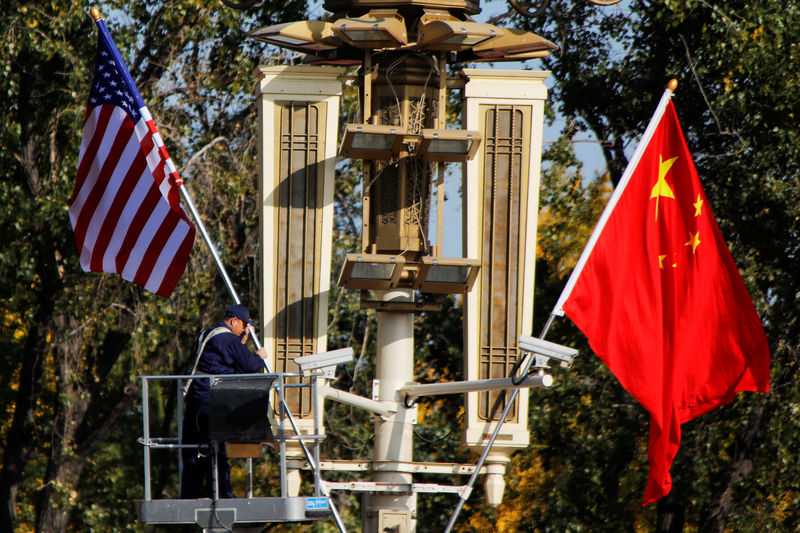By Steve Holland and Michael Martina
WASHINGTON/BEIJING (Reuters) - China said on Thursday that it welcomed an invitation by the United States to hold a new round of trade talks, as Washington prepares to further escalate the U.S.-China trade war with tariffs on $200 billion (153.21 billion pounds) worth of Chinese goods.
The Trump administration had invited Chinese officials to restart trade talks, the White House's top economic adviser said on Wednesday, news that gave a lift to Asian stocks, including Chinese shares and the yuan currency.
Chinese Foreign Ministry spokesman Geng Shuang told reporters that China welcomed the invitation, and the two countries were discussing the details.
"China has always held that an escalation of the trade conflict is not in anyone's interests. In fact, from last month's preliminary talks in Washington, the two sides' trade talk teams have maintained various forms of contact, and held discussions on the concerns of each side," he said.
Larry Kudlow, who heads the White House Economic Council, told Fox Business Network that U.S. Treasury Secretary Steven Mnuchin had sent an invitation to senior Chinese officials, but he declined to provide further details.
"There's some discussions and information that we received that the Chinese government – the top of the Chinese government wished to pursue talks," Kudlow said. "And so, Secretary Mnuchin, who is the team leader with China, has apparently issued an invitation."
Two people familiar with the effort said Mnuchin's invitation was sent to his Chinese counterparts, including Vice Premier Liu He, the top economic adviser to Chinese President Xi Jinping, for talks in coming weeks, with the time and the venue still to be agreed.
A meeting among Cabinet-level officials could ease market worries over the escalating tariff war that threatens to engulf all trade between the world's two largest economies and raise costs for companies and consumers.
"I think most of us think it's better to talk than not to talk, and I think the Chinese government is willing to talk," Kudlow earlier told reporters outside the White House.But Kudlow was non-committal over the chances of a breakthrough.
"I guarantee nothing."
The last talks, between mid-level U.S. and Chinese officials on Aug. 22 and 23, failed to reach any agreement.
RAISE OR FOLD
So far, the United States and China have hit $50 billion worth of each other's goods with tariffs in a dispute over U.S. demands that China make sweeping economic policy changes, including ending joint venture and technology transfer policies, rolling back industrial subsidy programs and better protecting American intellectual property.
The Trump administration is preparing to activate tariffs on $200 billion worth of Chinese goods, hitting a broad array of internet technology products and consumer goods from handbags to bicycles to furniture.
U.S. President Donald Trump said last week that he also had tariffs on an additional $267 billion worth of goods ready "on short notice if I want."
It was unclear whether any U.S.-China talks would delay the duties.
China has threatened retaliation, which could include action against U.S. companies operating there.
China's Commerce Ministry said both sides would want to avoid escalation.
"I believe both countries would not be willing to see such a situation," ministry spokesman Gao Feng said on Thursday.
GROWING DISMAY
The invitation, first reported by the Wall Street Journal, comes amid a swelling chorus of opposition to tariffs from Western business circles.
On Thursday, the U.S. business lobbies AmCham China and AmCham Shanghai published a joint survey showing that the negative impact on U.S. companies in China of tit-for-tat tariffs Washington and Beijing have imposed on one another was "clear and far reaching".
More than 60 percent of U.S. companies polled said the U.S. tariffs were already affecting their business operations, while a similar percentage said Chinese duties on U.S. goods were having an impact on business.
AmCham China and AmCham Shanghai urged the Trump administration to re-think its approach.
The European Union Chamber of Commerce in China released its own survey on Thursday saying the tariffs were causing "significant disruptions" to global supply chains and "seriously impacting" non-Chinese and non-American companies.
A day earlier, more than 60 U.S. industry groups launched a coalition - Americans for Free Trade - to take the fight against the tariffs public.
The Global Times, published by the ruling Communist Party's People's Daily, cautioned against seeing the invitation from Washington as a sign that the Trump administration had softened its stance.
"Washington's overall attitude is still tough, but they do not reject a 'talk and fight' strategy. By doing so, they can both ease the anxiety of American society and gradually collapse the will of the Chinese side," the newspaper said in an editorial on Thursday.
"China must hold the expectation that it is probably not the time when both sides can reach an agreement."
